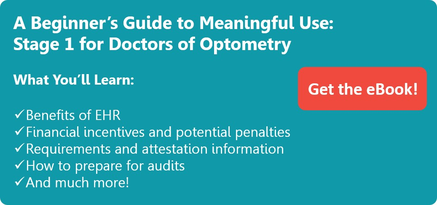10 for 10: How to Meet Meaningful Use Criteria for ODs
It’s the 6th edition of 10 for 10! You know the drill; we feature a member of VisionWeb’s tenacious 10 and ask them 10 questions about VisionWeb’s company culture, projects, insights, industry trends, and much more. Today, we interview Julia Crawford, Director of Product Strategy, and she’s here to talk about meeting meaningful use criteria for ODs.

1. What is your role at VisionWeb?
I am the Director of Product Strategy at VisionWeb. I develop concepts, coordinate, and implement the strategic direction of VisionWeb’s suite of products, services, and processes. My job is always changing so it’s never boring. As the industry evolves, the technology needs of VisionWeb’s partners and users also evolve. I am always looking for new collaborations and different ways of doing things. There’s inspiration at every turn.
2. Meaningful use has been a big topic in the healthcare industry, but what exactly is it?
The Meaningful Use Program was introduced in 2009 as part of the HITECH Act to promote the use of electronic health records (EHRs) in an effort to make healthcare more consistent, transparent, allow for the measurement of quality of care, and assure that patient health records are seamlessly transported between doctors regardless of their specialty.
3. What’s the first thing an OD needs to do to get started?
If you haven’t invested in a certified EHR, reduction in medical errors, clinical decision support, and improved communications between patients and other doctors are among the many benefits of an EHR. Registering for the program is as easy as filling out a form on the CMS website, but it is recommended that you communicate with your staff and have a plan to begin.
4. Meaningful use has been making a big impact on healthcare as a whole. What advice can you give ODs who are hesitant to get started?
If meaningful use is done the right way, it can improve your practice’s processes and allow you to see more patients and document everything properly. This will elevate the standard of patient care. But to make sure that it is done right, you need to find a system that makes it easy to do so. A lot of systems out there are already certified for Stage 2 meaningful use, but a lot don’t make it easy. A certified EHR is required for meaningful use, but finding an easy-to-use solution is just as important. Just because an EHR is Certified for Meaningful Use, doesn’t mean it is ‘meaningfully useful.’
5. How will participating in meaningful use affect a practice’s day-to-day tasks and routine?
The tasks required to meet the objectives of the program are basic tasks that you should already be doing. For example, core objectives include protecting electronic health information and maintaining an active medication allergy list. However, for auditing purposes, it is always a good idea to document everything, which might require extra measures and time.
6. Will it hurt a practice if they choose not to participate?
Yes. If practices choose not to participate by 2015, they will be penalized through lower reimbursements for care provided to Medicare patients. They will be subjected to the adjustments that start at 1% per year (starting in 2015), up to a maximum of 5% annual adjustment.
7. Does meaningful use have any benefits for patients?
In general, EHRs allow doctors to provide better care for their patients.
- EHRs allow collaboration with doctors of different specialties which means receiving more information about your patient and their history resulting in a more accurate diagnosis. Patients will have the benefit of having different doctors taking different points of view instead of individually which might lead to missing out on the whole picture.
- EHRs reduce medical errors (definitely a benefit when your patients don’t receive a wrong prescription).
- If your EHR comes with a patient portal, your patients will be able to submit questionnaires and review follow-up materials online, cutting down the amount of time in your practice. Furthermore, patients can communicate with their doctors and receive advice via secure email directly from the patient portal.
8. If a practice chooses not to participate in the meaningful use program, should they still get a certified EHR?
Absolutely! One of the key things for practice long term survivability is continual access to more patients. If a doctor chooses not to use a certified EHR they will not be able to participate in sharing patients with those doctors that have implemented a certified EHR. Also, a certified EHR will allow you to participate in other programs such as the Accountable Care Organization (ACO) and Patient Centered Medical Homes (PCMH).
9. How have the trends in the EHR scene changed since the introduction of the Meaningful Use Program?
We are seeing an increase in adoption of EHRs as well as more practices moving to more collaborative solutions. Though the rapid increase in adoption can mostly be attributed to the program’s financial incentives, as well as Medicare adjustments (aka penalties) for those that opt out of the program, more practices are actually seeing the benefit of having an EHR and moving away from paper records or a combination of solutions.
10. What’s your favorite thing about working at VisionWeb?
VisionWeb is like family to me. My favorite thing by far is the people I work with and the freedom I have to collaborate on new ideas to always be improving our products and services to the customer.
We hope that Julia was able to answer some questions you may have about meaningful use. But if you are still a little confused or hesitant to get started, download our eBook and find out everything you need to know about Stage 1 Meaningful Use.


